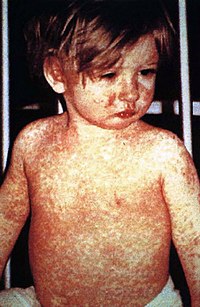
Photo from wikipedia
Thrombotic microangiopathy (TMA) comprises a process of sequential endothelial damage, microvascular thrombosis, consumptive thrombocytopenia and microangiopathic haemolytic anaemia that can affect several organs, including the kidney. A 36-year-old woman was… Click to show full abstract
Thrombotic microangiopathy (TMA) comprises a process of sequential endothelial damage, microvascular thrombosis, consumptive thrombocytopenia and microangiopathic haemolytic anaemia that can affect several organs, including the kidney. A 36-year-old woman was presented with a petechial rash 3 weeks after an upper respiratory tract infection. Laboratory results showed normocytic normochromic anaemia, thrombocytopenia and evidence of TMA with decreased haptoglobin, elevated serum lactate dehydrogenase and a peripheral blood smear with numerous schistocytes. Treatment included daily plasmapheresis and prednisolone, with favourable clinical evolution. Antibodies anti-ADAMTS13 were positive, establishing the diagnosis of acquired thrombotic thrombocytopenic purpura. There was also serological evidence of a recent infection by Mycoplasma pneumoniae, and therefore the preceding respiratory tract infection by this agent was the most likely trigger for the disease. Due to the high mortality rate and poor outcomes, the prompt diagnostic and treatment are crucial in this rare disease. The identification of triggers related to this pathology can allow new therapeutic targets or preventive strategies.
Journal Title: BMJ Case Reports
Year Published: 2018
Link to full text (if available)
Share on Social Media: Sign Up to like & get
recommendations!